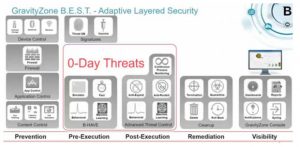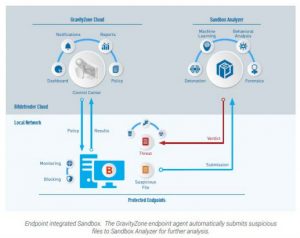 On Wednesday, August 16th, East Palo Alto, CA-based web security firm Finjan (NASDAQ:FNJN) filed a complaint for patent infringement against online security software provider Bitdefender, Inc. of Fort Lauderdale, FL. In the suit, Finjan asserts four patents in the case and alleges that Bitdefender’s marketing of antivirus, cloud and sandboxing technologies infringes upon the patents-in-suit. The case has been filed in the Northern District of California.
On Wednesday, August 16th, East Palo Alto, CA-based web security firm Finjan (NASDAQ:FNJN) filed a complaint for patent infringement against online security software provider Bitdefender, Inc. of Fort Lauderdale, FL. In the suit, Finjan asserts four patents in the case and alleges that Bitdefender’s marketing of antivirus, cloud and sandboxing technologies infringes upon the patents-in-suit. The case has been filed in the Northern District of California.
The four patents-in-suit asserted by Finjan include:
- U.S. Patent No. 6804780, titled System and Method for Protecting a Computer and a Network from Hostile Downloadables. It claims a computer-implemented method for generating a downloadable ID to identify a downloadable by performing several tests on the downloadable to determine whether to allow or block the download.
- U.S. Patent No. 7930299, titled System and Method for Appending Security Information to Search Engine Results. It discloses a method by which security information is appended to search engine results to reduce any time wasted by computer users using security filters, encouraging users to refrain from clicking on links with unsafe content.
- U.S. Patent No. 8141154, titled System and Method for Inspecting Dynamically Generated Executable Code. It claims a system for protecting a computer from dynamically generated malicious content which provides a new form of behavioral analysis to shield computers without running on the computer being shielded.
- U.S. Patent No. 8677494, titled Malicious Mobile Code Runtime Monitoring Systems and Methods. It discloses a computer-implemented method of receiving an incoming downloadable, deriving security profile data of the downloadable including a list of suspicious computer operations the downloadable may attempt, and then storing the downloadable security profile data in a database.
Finjan’s suit against Bitdefender alleges that Bitdefender was presented with written notice of the alleged infringement of Finjan’s patents as early as February 2015. In October 2015, Finjan alleged that it discussed the ‘844, ‘154 and ‘494 patents with Bitdefender and how those patents read on technology practiced by Bitdefender. Despite numerous in-person and telephone meetings, Finjan alleges that that Bitdefender has continued to engage in willful and deliberate infringement of Finjan’s IP.
The complaint identifies a series of accused products marketed by Bitdefender which Finjan believes infringe upon the asserted patents-in-suit. The accused products include Total Security anti-malware software, Mobile Security for Android devices, GravityZone Business Security which provides anti-ransomware protection, and Cloud Security for MSPs  which provides cloud-based central administration for endpoint security for an entity’s customers. The accused products offered by Bitdefender utilize technologies such as layered security to 0-day threats, or undisclosed computer software vulnerabilities which hackers can exploit, cloud-scanning technologies to identify malicious software threats as well as a Search Advisor technology which rates search results which identifies whether a link will direct a user to a secure website.
which provides cloud-based central administration for endpoint security for an entity’s customers. The accused products offered by Bitdefender utilize technologies such as layered security to 0-day threats, or undisclosed computer software vulnerabilities which hackers can exploit, cloud-scanning technologies to identify malicious software threats as well as a Search Advisor technology which rates search results which identifies whether a link will direct a user to a secure website.
 The Finjan suit discloses the aspects of the technology underpinning the accused products which allegedly covered by Finjan’s patents. Bitdefender products which fetch software components of an incoming downloadable, such as EXE or PDF files, and perform a hashing function to generate a downloadable ID infringe upon the ‘780 patent, according to Finjan. Bitdefender products including the Search Advisor function allegedly infringe upon the ‘299 patent. Bitdefender products utilizing cloud security functions to protect computers from dynamically generated malicious content allegedly infringe the ‘154 patent. The ‘494 patent is allegedly infringed upon by Bitdefender products which create a security list identifying suspicious computer operations for downloadables using machine learning techniques. Finjan also alleges indirect infringement of the ‘494, ‘299 and ‘780 patents caused by Bitdefender’s instructions to customers and users to perform some of the steps of the claims in those patents.
The Finjan suit discloses the aspects of the technology underpinning the accused products which allegedly covered by Finjan’s patents. Bitdefender products which fetch software components of an incoming downloadable, such as EXE or PDF files, and perform a hashing function to generate a downloadable ID infringe upon the ‘780 patent, according to Finjan. Bitdefender products including the Search Advisor function allegedly infringe upon the ‘299 patent. Bitdefender products utilizing cloud security functions to protect computers from dynamically generated malicious content allegedly infringe the ‘154 patent. The ‘494 patent is allegedly infringed upon by Bitdefender products which create a security list identifying suspicious computer operations for downloadables using machine learning techniques. Finjan also alleges indirect infringement of the ‘494, ‘299 and ‘780 patents caused by Bitdefender’s instructions to customers and users to perform some of the steps of the claims in those patents.
Finjan’s suit seeks a jury trial and damages including a reasonable royalty for past damages, injunctive relief, enhanced damages for willful infringement and attorney’s fees. A press release issued by Finjan after filing the suit against Bitdefender notes that Finjan is currently engaged in a series of pending infringement suits and appeals based on more than 20 patents in Finjan’s portfolio, including those asserted against Bitdefender. Those lawsuits target companies such as Cisco Systems (NASDAQ:CSCO), FireEye Inc. (NASDAQ:FEYE), Symantec Corporation (NASDAQ:SYMC) and Palo Alto Networks Inc. (NYSE:PANW)

![[IPWatchdog Logo]](https://ipwatchdog.com/wp-content/themes/IPWatchdog%20-%202023/assets/images/temp/logo-small@2x.png)

![[Advertisement]](https://ipwatchdog.com/wp-content/uploads/2024/04/Artificial-Intelligence-2024-REPLAY-sidebar-700x500-corrected.jpg)
![[Advertisement]](https://ipwatchdog.com/wp-content/uploads/2024/04/UnitedLex-May-2-2024-sidebar-700x500-1.jpg)
![[Advertisement]](https://ipwatchdog.com/wp-content/uploads/2024/04/Patent-Litigation-Masters-2024-sidebar-700x500-1.jpg)

![[Advertisement]](https://ipwatchdog.com/wp-content/uploads/2021/12/WEBINAR-336-x-280-px.png)
![[Advertisement]](https://ipwatchdog.com/wp-content/uploads/2021/12/2021-Patent-Practice-on-Demand-recorded-Feb-2021-336-x-280.jpg)
![[Advertisement]](https://ipwatchdog.com/wp-content/uploads/2021/12/Ad-4-The-Invent-Patent-System™.png)






Join the Discussion
One comment so far.
Paul F. Morgan
August 24, 2017 08:55 amThis history of presenting written notice of the alleged infringement, discussing the patents with the prospective licensee, including how those patents read on
their products in in-person and telephone meetings, and then suing for patent infringement only after no license agreement can be reached, is how reputable companies SHOULD conduct patent business [with appropriate negotiation agreements] – instead of filing suit out of the blue in E.D.TX, especially since that is now far less likely. The alleged reason for avoiding such pre-suit negotiations – a D.J. suit in an allegedly more favorable forum – was always exaggerated, as shown by the low number of such D.J. suits and their track records. The prospective licensee should also present prior art and non-infringement arguments in writing such pre-suit negotiations, since they cannot be kept secret or used nearly as effectively after they get sued. If those defense arguments are valid they could even provide a basis for Rule 11 sanctions, attorney fee sanctions, etc.